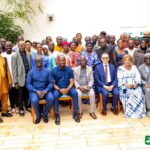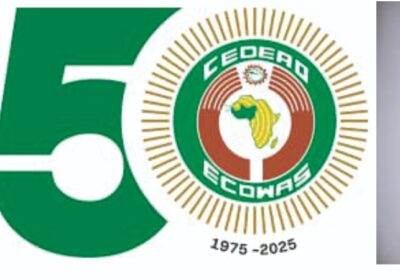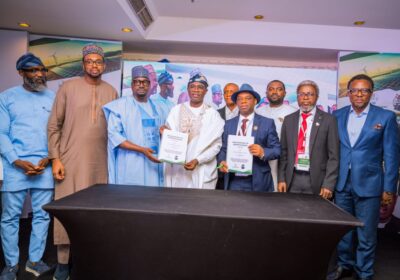Tinubu to Defence College: ‘Inclusive Governance and a Productive Nigeria Are Our Collective Duty’…President backs industrialisation drive, Native 2040 plan for security and growth.
By Raymond Enoch
President Bola Ahmed Tinubu has declared that building an inclusive, productive and secure Nigeria is a “collective responsibility,” as he reaffirmed his administration’s commitment to harnessing the country’s human, material and intellectual resources for industrialisation, peace and prosperity.
The President spoke at the Council Chamber of the State House, Abuja, where he received participants of Course 33 of the National Defence College (NDC), Nigeria’s apex military training institution.
Addressing the delegation, President Tinubu urged the participants to see themselves not only as security professionals but as frontline actors in national development, praising their patriotism and commitment throughout the programme.
“We are building here a political, economic and security future. We must develop Nigeria. The strategic path to industrialisation, as presented in your research work, confirms this,” the President said, assuring that his government would provide an enabling environment to find inclusive solutions to emerging socio-economic challenges.
Tinubu reiterated his administration’s resolve to strengthen Nigeria’s defence and military institutions to produce “a new generation of competent strategic leaders,” capable of reinforcing national power in an evolving security environment.
“We must train future strategic leaders with the knowledge and analytical skills to strengthen national power in defence and security,” he said. “It is our collective responsibility to ensure that Nigeria is productive, inclusively governed and able to secure the future of generations yet unborn.”
Describing productive governance as a patriotic duty, the President stressed the need for resilience, forward thinking and industrial growth.
“It is our patriotic duty to look ahead, to be determined and resilient, to mobilise our capacity for greatness, to train our people, grow our economy, promote industrial development and guarantee the sovereignty of our country, protect it and sustain it,” he added.
Tinubu also appealed to the NDC authorities for patience over the long-delayed completion of the institution’s permanent site, a project initiated in 2010.
Earlier, Commandant of the National Defence College, Rear Admiral M.A. Ahmed, described the NDC, established in 1992, as Nigeria’s most prestigious professional military education institution. He said the theme for Course 33 was: “Strengthening Institutions for National Security and Development in Nigeria.”
According to him, the current course comprises 99 participants: 25 from the Nigerian Army, 16 from the Navy, 12 from the Air Force, five from the Police, 18 from various ministries, departments and agencies (MDAs), and 23 international participants drawn from Africa, Asia and South America. To date, the College has graduated 3,097 participants from Nigeria’s armed forces, police and friendly African countries.
Presenting the course research report titled “Leveraging Local Manufacturing for Enhanced National Security by 2040,” the team leader, Captain M.A. Ahmed, said the study aligns with President Tinubu’s Renewed Hope Agenda, especially in economic diversification through industrialisation, digitalisation, creativity and manufacturing.
He disclosed that NDC research teams visited more than 23 countries across Africa, Europe and Asia to understudy their national manufacturing sectors, which are central to job creation, wealth generation and overall economic growth. Qatar, he noted, provided a particularly striking case study because of its similarities with Nigeria’s oil-dependent economy.
“Qatar once had a mono-economy where oil and gas accounted for about 90 per cent of exports and nearly 51 per cent of GDP, similar to Nigeria’s position in 2007. The Qatari government implemented several strategic interventions and invested over 300 billion dollars between 2011 and 2022. Our team drew key lessons from this transformation,” he explained.
The research team commended the Tinubu administration’s economic efforts, observing that current projections show only two countries with higher expected GDP growth than Nigeria by 2026. It recommended massive investment in infrastructure, rigorous product standardisation, and robust support for Nigeria’s military-industrial complex, particularly the Defence Industries Corporation of Nigeria (DICON), to drive industrial integration, vertical linkages and large-scale job creation.
The presentation concluded with a call for clear presidential directives to implement the proposed Native 2040 project, arguing that visionary leadership and strategic execution would enable Nigeria to fully leverage local production for national security and development by 2040.








